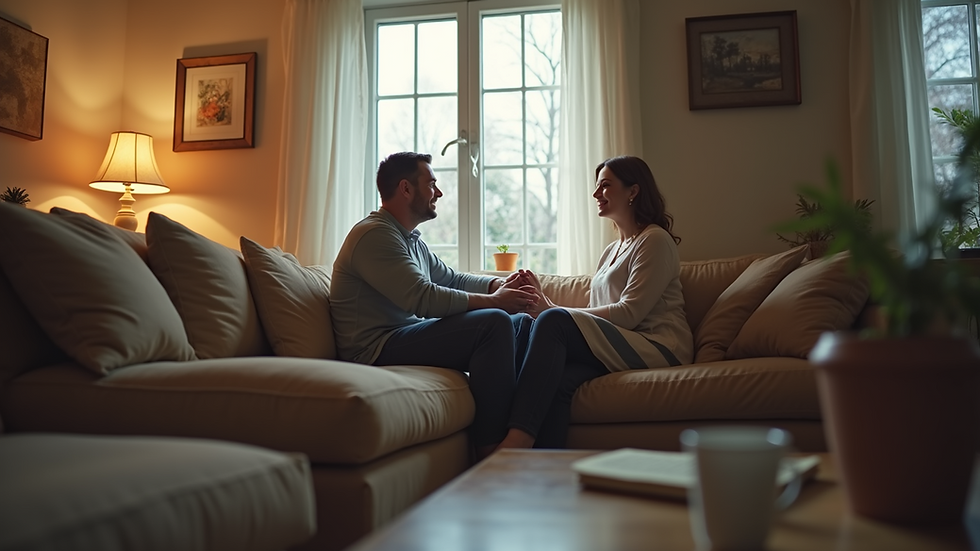The Role of Communication in Healthy Relationships
- taylor9434
- Aug 11, 2025
- 4 min read
Communication is the foundation of any strong and lasting relationship. It allows partners to express their feelings, share their thoughts, and resolve conflicts in a way that strengthens their bond. Without effective communication, misunderstandings and resentment can build up, leading to distance and dissatisfaction. This article explores the vital role communication plays in healthy relationships and offers practical advice to improve how couples connect.
Why Communication is Essential for Healthy Relationships
Healthy relationships thrive on open and honest communication. When partners talk openly, they build trust and understanding. This creates a safe space where both individuals feel valued and heard. Communication is not just about talking but also about listening actively and empathetically.
For example, when one partner shares a concern, the other should listen without interrupting or judging. This shows respect and validates the speaker’s feelings. Over time, this practice helps couples avoid unnecessary arguments and deepens their emotional connection.
Good communication also helps couples navigate challenges together. Whether it’s managing finances, parenting, or career changes, discussing issues calmly and clearly allows partners to find solutions that work for both. It prevents small problems from escalating into bigger conflicts.

Key Communication Skills for Building Healthy Relationships
To foster healthy relationships, couples need to develop specific communication skills. These skills help partners express themselves effectively and understand each other better.
1. Active Listening
Active listening means fully concentrating on what your partner is saying. It involves:
Making eye contact
Nodding or giving verbal affirmations like "I see" or "I understand"
Avoiding distractions such as phones or TV
Reflecting back what you heard to confirm understanding
For instance, if your partner says, "I feel overwhelmed with work," you might respond, "It sounds like you’re really stressed right now. How can I support you?"
2. Using “I” Statements
Instead of blaming or accusing, use “I” statements to express your feelings. This reduces defensiveness and encourages open dialogue. For example:
Instead of saying, "You never listen to me," say, "I feel unheard when I try to talk about my day."
3. Being Clear and Specific
Avoid vague statements. Be clear about what you want or need. For example, instead of saying, "You don’t help around the house," say, "I would appreciate it if you could do the dishes after dinner."
4. Managing Emotions
It’s normal to feel upset during disagreements, but managing emotions is key. Take deep breaths, pause if needed, and avoid yelling or name-calling. Calm communication leads to better problem-solving.
5. Nonverbal Communication
Body language, facial expressions, and tone of voice all convey messages. Positive nonverbal cues like smiling, nodding, and open posture reinforce verbal communication.

Can couples therapy help with communication?
Sometimes, despite best efforts, couples struggle to communicate effectively. This is where professional help can make a difference. Couples therapy provides a safe environment to explore communication patterns and learn new skills.
A trained therapist guides partners to:
Identify negative communication habits
Understand each other’s perspectives
Practice healthier ways to express feelings and needs
Therapy can also address underlying issues such as past trauma, trust problems, or emotional barriers that hinder communication. Many couples find that therapy strengthens their relationship and improves intimacy.
If you want to explore this option, consider couples therapy communication to enhance your connection and resolve conflicts more effectively.

Practical Tips to Improve Communication in Your Relationship
Improving communication takes practice and commitment. Here are some actionable tips to help couples communicate better every day:
Set aside regular time to talk
Dedicate at least 15 minutes daily to check in with each other without distractions.
Practice gratitude
Express appreciation for your partner’s efforts and qualities regularly.
Use technology wisely
Avoid texting about serious issues; opt for face-to-face or phone conversations instead.
Agree on “time-outs”
If a discussion becomes too heated, agree to pause and resume when calmer.
Be patient and forgiving
Communication skills improve over time. Be patient with yourself and your partner.
Ask open-ended questions
Encourage deeper conversations by asking questions like, "How did that make you feel?" or "What do you think we can do differently?"
Avoid assumptions
Clarify rather than assume your partner’s intentions or feelings.
By incorporating these habits, couples can create a more supportive and understanding relationship environment.
Building a Lasting Connection Through Communication
Healthy relationships are built on continuous effort and mutual respect. Communication is the bridge that connects two people emotionally and intellectually. When partners communicate well, they can face life’s ups and downs together with resilience.
Remember, communication is a skill that anyone can develop. It requires honesty, empathy, and a willingness to listen and learn. Whether you are just starting a relationship or have been together for years, prioritizing communication will help you grow closer and enjoy a fulfilling partnership.
Investing time and energy into improving how you communicate is one of the best gifts you can give your relationship. It opens the door to deeper love, trust, and happiness.
By focusing on communication, couples can transform their relationships into healthy, supportive, and joyful connections that last a lifetime.



Comments